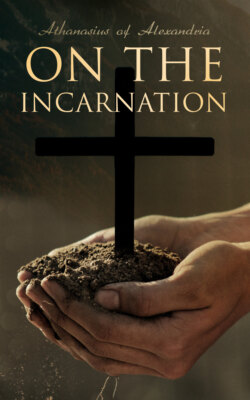Читать книгу On the Incarnation - Athanasius of Alexandria - Страница 8
На сайте Литреса книга снята с продажи.
§6.
ОглавлениеTable of Contents
The human race then was wasting, God ’s image was being effaced, and His work ruined. Either, then, God must forego His spoken word by which man had incurred ruin; or that which had shared in the being of the Word must sink back again into destruction, in which case God ’s design would be defeated. What then? was God ’s goodness to suffer this? But if so, why had man been made? It could have been weakness, not goodness on God ’s part.
For this cause, then, death having gained upon men, and corruption abiding upon them, the race of man was perishing; the rational man made in God ’s image was disappearing, and the handiwork of God was in process of dissolution. 2. For death, as I said above, gained from that time forth a legal1 hold over us, and it was impossible to evade the law, since it had been laid down by God because2 of the transgression, and the result was in truth at once monstrous and unseemly. 3. For it were monstrous, firstly, that God, having spoken, should prove false —that, when once He had ordained that man, if he transgressed the commandment, should die the death, after the transgression man should not die, but God ’s word should be broken. For God would not be true, if, when He had said we should die, man died not. 4. Again, it were unseemly that creatures once made rational, and having partaken of the Word, should go to ruin, and turn again toward non-existence by the way of corruption3. 5. For it were not worthy of God ’s goodness that the things He had made should waste away, because of the deceit practised on men by the devil. 6. Especially it was unseemly to the last degree that God ’s handicraft among men should be done away, either because of their own carelessness, or because of the deceitfulness of evil spirits.
7. So, as the rational creatures were wasting and such works in course of ruin, what was God in His goodness to do? Suffer corruption to prevail against them and death to hold them fast? And where were the profit of their having been made, to begin with? For better were they not made, than once made, left to neglect and ruin. 8. For neglect reveals weakness, and not goodness on God ’s part —if, that is, He allows His own work to be ruined when once He had made it —more so than if He had never made man at all. 9. For if He had not made them, none could impute weakness; but once He had made them, and created them out of nothing, it were most monstrous for the work to be ruined, and that before the eyes of the Maker. 10. It was, then, out of the question to leave men to the current of corruption; because this would be unseemly, and unworthy of God ’s goodness.
Footnotes
1 Gen. ii. 15.
2 Gal. iii. 19 (verbally only).
3 Cf. Anselm cur Deus Homo, II. 4, ‘Valde alienum est ab eo, ut ullam rationalem naturam penitus perire sinat. ’
